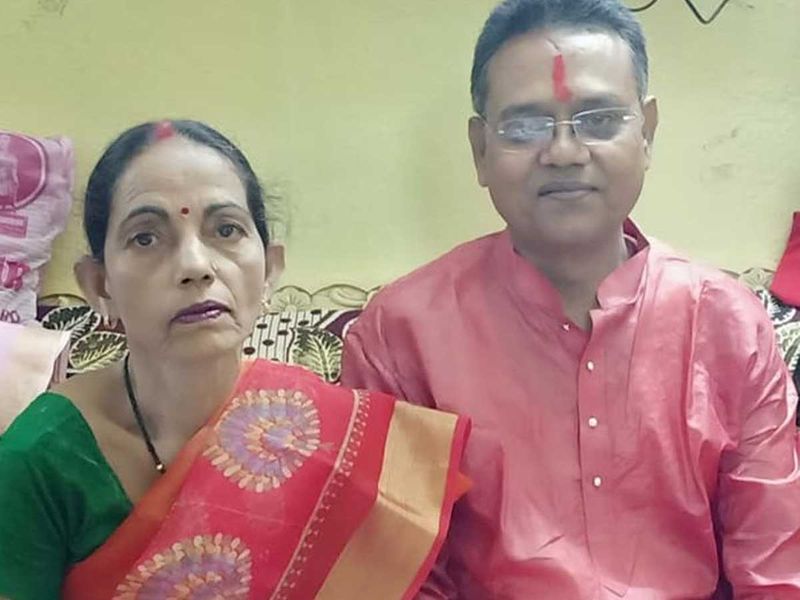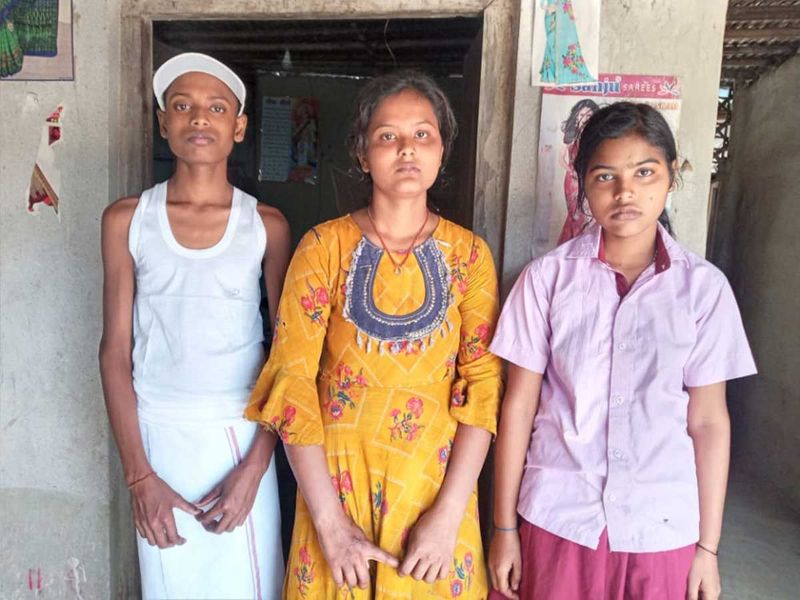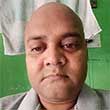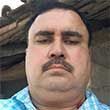Patna: COVID-19 in India has affected people in different ways. Many have lost their lives or their loved ones in the fight against the coronavirus. But survivors have said that being shunned by relatives and neighbours is far worse than being infected with the virus. Bihar has been badly hit by the second wave of the pandemic. We spoke to a few pandemic-hit survivors on their experience in fighting COVID-19.
Sunil Sinha: I never imagined that life could be so cruel to my family
Life was going smooth for Sunil Sinha, a journalist with a local vernacular daily based in Patna, until April 19 when he posted on Facebook that he had tested positive for COVID-19. There was nothing unusual about this because coronavirus infections were spreading fast across Bihar.
“How would I have remained ‘negative’ when everyone was getting positive one by one? So, I too tested positive today,” Sinha wrote on his Facebook page. Little did he know that the worst was yet to come.

Very soon, six other members of his family tested positive and all stayed in home quarantine. But within the next few days, he lost five members from his family.
On April 23, Sinha announced that his wife Ananya Sinha had died. On April 27, he lost his brother-in-law Rakesh R Priyadarshi, on April 30 his brother, on May 2, his sister-in-law and on May 10, his sister died of COVID-19.
“I never imagined that life could be so cruel to my family. Coronavirus has ruined my world. It will take years to heal my wounds, and I am still not sure if they will be really healed,” says Sinha.
Sinha turns restless when asked to narrate his story. According to him, his wife suffered from severe diarrhoea after recovery, but did not receive medical help despite his all efforts and using his contacts in the local administration and the health department. She needed to be admitted immediately to the hospital for treatment.
I saw her collapsing on the bed but was helpless
“I put in all my efforts to get a bed at any hospital in Patna and surroundings but didn’t. I had no option but to keep her at home despite her condition worsening fast. I saw her collapsing on the bed but was helpless,” narrated Sinha. His efforts to arrange an oxygen cylinder after paying an exorbitant price — Rs12,000 — too went in vain. Sinha is now shocked and shattered after losing so many members from his family in a span of a few days.
He underwent similar mental trauma when his brother-in-law Priyadarshi who stayed with him on the first floor of his house in Patna also died due to COVID-19. Priyadarshi had been admitted to a private hospital in Kankarbagh locality of Patna after he encountered breathing problems. But one day the hospital asked his family to take him back saying there was a severe shortage of oxygen at the hospital.
“We again made serious efforts and got him shifted to a government-run medical facility, Nalanda Medical College and Hospital, in Patna but the scene at the hospital was terrible. There was no-one to even give water and fit an oxygen mask over the patient’s nose and mouth,” Sinha said. After noticing this, the family continued searching for a hospital with a ventilator to shift the patient there. “But barely an hour after moving to the new hospital, he passed away.”
Sinha is not the only person to undergo this harrowing experience. There are many families in Bihar who have lost their loved ones and faced social boycott after being tested positive for the coronavirus. For many, the behaviour of relatives and neighbours pained them more than the sufferings caused by COVID-19.
Soni Kumari: No-one came to help us when my mother died
The story of 15-year-old girl Soni Kumari, a resident of Raniganj block in eastern Bihar’s Araria district, is even more distressing. She not only lost her parents in a gap of four days, but also faced starvation and social boycott as no-one offered to help.
“Our horror story began the day our parents tested positive. The society and relatives behaved as if my parents were the only ones who had contracted coronavirus in the country and that everyone in the village would die if they helped us,” Soni said.

Soni’s parents, Birendra Mehta, 40, and his wife Priyanka Devi, 32, had tested positive for coronavirus on April 28. Both were shifted to a private hospital in neigbouring Purnia town where her father Mehta succumbed on May 3. Subsequently, her mother’s condition deteriorated but since the family had no money to treat her, she was withdrawn from the hospital and brought home till money could be arranged.
On reaching home, Priyanka’s condition started worsening after which she was rushed to a local government hospital at Forbresganj Covid Care centre. But finding her condition critical, the hospital referred her to the government medical college and hospital in Madhepura town, some 92km from Forbesganj. She died on way to hospital on May 7.
We sold landed property and cattle to arrange money for treating our parents. Sadly they didn’t survive.
After her death, her body was brought to the village but no relative or neighbour came forward to help her perform the last rites of her mother. Eventually, Soni, who is the eldest among three siblings, carried her mother’s body to the backyard of the house with the help of her brother and sister, dug out a grave and buried her. Soni dressed herself in a PPE suit before performing the last rites of her mother.
“No-one came to help us when my mother died. More than the deaths of my parents, the behaviour of the society has shocked us,” Soni said, narrating her experience over phone. She said they had lost everything due to coronavirus and were battling hunger.
“We sold landed property and cattle to arrange money for treating our parents. Sadly they didn’t survive,” she said. A social worker Prabhat Yadav has launched a campaign on social media to help the children in crisis.
Manish Kumar: Attendants at the hospital would scream after the death of a family member
Manish Kumar, a resident of Patna, profusely thanks a person working with a medical company for saving his life. Kumar, a photographer, came to know about his own infection only after undergoing a CT scan of his chest. Although he survived, he lost his uncle to coronavirus.
“I had no symptoms of COVID-19. I suffered from only fever and when I went to see a doctor I was told this could be because of heatstroke. He said I would recover within five days,” Manish said. He consulted another physician when his condition didn’t improve even after five days and the doctor suggested CT scan of his lungs. It was only then that COVID-19 could be detected but by then his condition had turned serious.
“After I turned critical, I searched for a bed in every hospital in Patna, such as Ruban, Paras, AIIMS-Patna, PMCH (Patna Medical College and Hospital), Patliputra Ashoka and Medanta, but all said beds were not available,” Manish said.

The patients were dying, and I panicked at the thought of not recovering.
“As a last resort, I called up a contact in a medical company and told him that I would die if I was not admitted to the hospital soon. He arranged a bed at a private hospital and my life was saved.” He said the scene at the hospital was dreadful. “I never slept well at the hospital as the attendants would always scream after the death of their family members. The patients were dying, and I panicked at the thought of not recovering. Thank God I am alive now,” Manish said.
Deepak Mishra: My neighbours stopped visiting my home
The story of Deepak Mishra, a resident of Bhagalpur district, is not different. Mishra, who worked in Patna, was alarmed when he lost his sense of taste and smell. After being tested positive on April 3, he fled his native village in Bhagalpur but his decision affected the entire family.
“We all stayed in home isolation but faced a food crisis as there was no-one to cook food. What was worse, my neighbours stopped visiting my home after coming to know that we all were COVID-19 positive,” Deepak said. A distant relative came to their rescue at this time. He would drop food packets outside the door and ring the bell.

Sadly, the people have stopped making even phone calls to their friends in distress.
All of them have now overcome the crisis but the social boycott they faced continues to hurt. “Half of the problem is over the moment someone inquires about your wellbeing. It’s not necessary to visit homes too; they can simply do that even by making a phone call. Sadly, the people have stopped making even phone calls to their friends in distress. India is certainly not known for this!” he said.
from World,Europe,Asia,India,Pakistan,Philipines,Oceania,Americas,Africa Feed https://ift.tt/2RynYY2
No comments:
Post a Comment